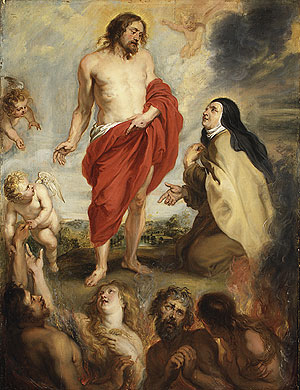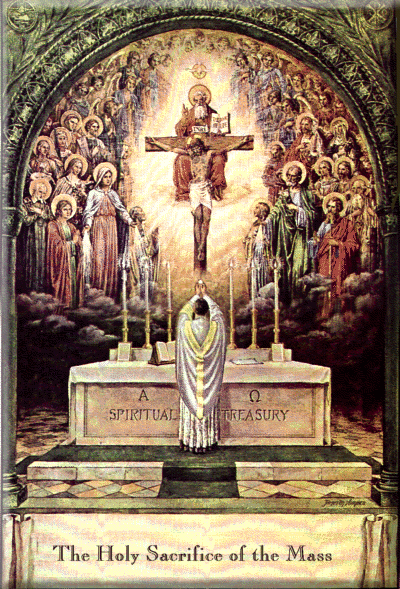Prayer
for the Dead
The
belief of the Church based on the Word of God as revealed in the second Book of Maccabees, is that it is a holy and worthwhile thing to pray for the dead that
they may be freed
from sin. The people of God from the earliest times have acted on this
conviction in various ways.
 |
| St. Teresa of Avila interceding for the souls in purgatory |
Gregorian
Masses
One
tradition that has come down to us, as related by Pope St. Gregory the Great
(590-604) in his treatise on the Immortality of the Soul, is that there is
special efficacy in having Mass celebrated on thirty consecutive days for a
deceased person. For this reason they are known as Gregorian Masses.
The
Roman Catholic Church has established strict regulations concerning the celebration
of Gregorian Masses.
1. Gregorian Masses are offered
for only one deceased person.
2. Gregorian Masses cannot be
offered for several deceased, nor for all the faithful departed.
3. Gregorian Masses must be offered
one each day for thirty consecutive days. Should the series be interrupted for
any reason, it must be begun again.
In
addition, though the thirty consecutive Masses in the Gregorian series need not
be celebrated by the same priest, nor at the same altar, they must each be
offered for the same departed person for each of the consecutive thirty days.
As you
will appreciate, few priests by reason of their work are free and able to offer
the thirty consecutive Masses of the Gregorian series without interruption.
Hence, it requires extra time to arrange to have the Gregorian Masses scheduled
as this cannot be done usually in a place where only one priest is stationed;
in case he falls ill, there must be at least one other priest available, and
free to continue the Masses without interruption.
This
will explain why a higher stipend is normally requested for the thirty
Gregorian Masses.

Ancient
Tradition
In
accordance with a Catholic tradition of over 1,300 years, a series of thirty
Holy Masses, known as Gregorian Masses, is offered on thirty consecutive days
exclusively
for the
repose of the soul of a departed person.
The
name derives from Pope St. Gregory the Great who was the first to popularize
this pious practice. St. Gregory relates in his Dialogues how, when he had
finished the series of thirty Masses for a departed monk, the monk appeared to
tell he had thus gained entry into glory on completion of the Gregorian Masses.
The
hallowed tradition has been declared a “pious and reasonable belief of the
faithful” on the authority of the Sacred Roman Congregation on Indulgences.
The
customary offering for the uninterrupted series of thirty daily consecutive Gregorian
Masses (for one deceased person only) is a donation of $400.

No comments:
Post a Comment